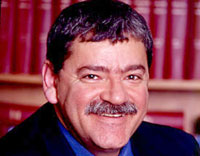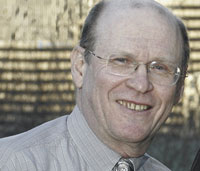Headliners: Walking, wildlife, and worried rats
Headliners: Walking, wildlife, and worried rats McGill University
User Tools (skip):
HEADLINERS
Walking, wildlife, and worried rats
Walk it off
A recent trip to a Dutch suburb seems to have inspired McGill professor of architecture and author of Sustainable Residential Development Avi Friedman, who penned an op-ed featured in the Victoria Times Colonist and the Saskatoon StarPhoenix, calling on Canada to adopt the example of communities designed for walking.
"What was most evident in the streets of Meerlo," says Friedman, "was that people, not cars, owned the road. Strolling along, I could not help but wonder why walking had been erased from the urban vocabulary of many Canadian towns and suburbs."
Friedman sees low-density development as the culprit, which make local amenities economically unfeasible. "As a result, the distance between homes and shops, schools and libraries in many suburbs has grown beyond walking distance," a phenomenon not without its share of negative effects on both the environment and human health.
Friedman's solution? "Planning walkable communities can address these issues by considering the needs of pedestrians alongside those of car users." He concludes that policy makers must "invest in building new care facilities or in promotion of healthy and active lifestyles," concluding that "the latter will be cheaper and is likely to make neighbourhoods friendlier."
Forests reborn
Ten years ago, one might have been hard pressed to find anyone with a good thing to say about the ice storm, particularly when it came to Quebec hardwood forests such as Mount Royal's, which were left a battered mess. The Montreal Gazette reports, however, that experts such as McGill professor of biology Martin Lechowicz are making a remarkable observation: the forests are bouncing back and biodiversity is now actually increasing.
"The incredible resilience of the forest gives me hope," says Lechowicz. "In terms of water filtration and diversity of wildlife, that is all there. From an environmental point of view, it's a real signal that the Earth has tremendous healing power."
Lechowicz notes that while the ice storm was the most destructive in the history of the province's hardwood forests such disasters are nature's way of pruning trees, as the weight of the ice causes dead branches to break off.
"Because they can live more than five times as long as humans, trees have much to teach us," Lechowicz explains. "They're in it for the long haul in a way we find difficult to appreciate. We have pushed exploitation beyond nature's limits, but if our civilization collapses, I'm sure the Earth will heal itself."
Grands succès en sciences

TREMBLAY: ...et une deuxième!
La plus récente édition de Québec Science contient de bonnes nouvelles pour quatre chercheurs de McGill : leurs résultats figurent parmi les Dix découvertes de l'année, un palmarès annuel compilé par le magazine scientifique.
Michel L. Tremblay, directeur du Centre de recherche sur le cancer de McGill, sa collègue Sofi Julien et l'équipe du Centre furent reconnues pour leurs travaux de recherche en cancer, ayant décodé le rôle d'un gène déficient chez des femmes atteintes de cancer. Ils ont démontré que l'inhibition du gène peut avoir comme effet d'empêcher le développement de tumeurs, ainsi que de combattre le diabète et l'obésité.

SONENBERG: Une grande découverte...
De plus, Nahum Sonenberg et Thomas Duchaine du Département de biochimie et du Centre de recherche sur le cancer ont aussi avancé le progrès des traitement pour le cancer en découvrant l'élément clé du contrôle de l'acide ribonucléique (ARN) messager, l'un des principaux régulateurs de gène.
Félicitations aux chercheurs, et bonne chance lors du vote pour la découverte de l'année !

